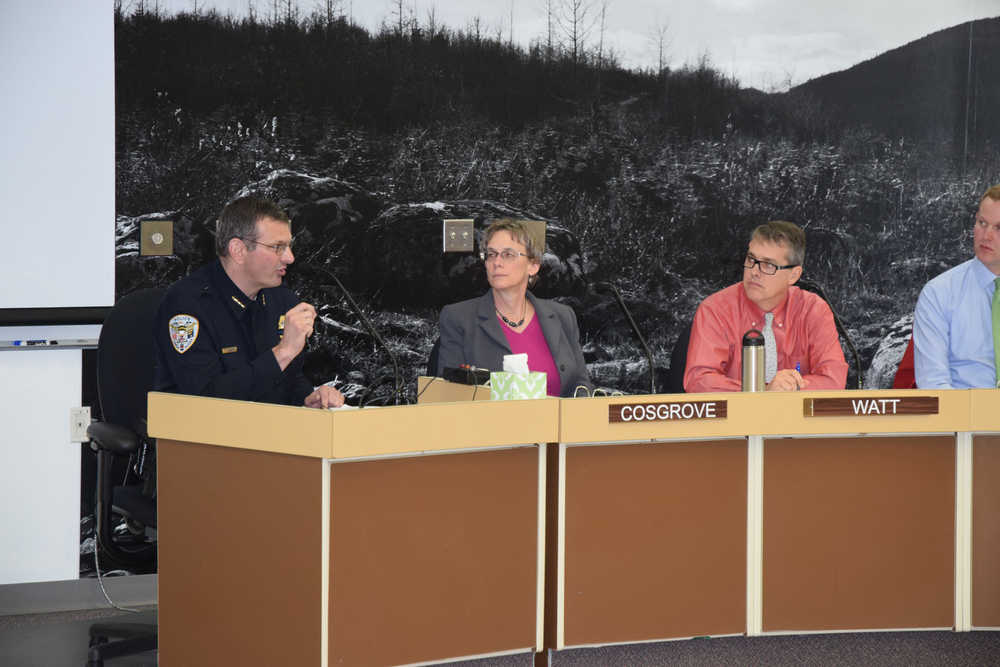The City and Borough of Juneau Assembly postponed talks of restricting fireworks usage at a committee meeting Monday, instead requesting the Juneau Police Department mitigate the issue using an existing ordinance.
The Assembly won’t take the issue up again until April 2017, when JPD has had time to quell unreasonable fireworks usage under Juneau’s disturbing the peace code. Assembly Member Jerry Nankervis’ motion to postpone acting on the city’s draft fireworks ordinance passed 5-3.
“I think we are getting far ahead of ourselves here with the draft ordinance,” Nankervis said. “… We don’t have information on whether or not the current noise ordinance will work.”
According to Nankervis, issuing citations under a fireworks ordinance won’t be any easier than doing so under the disturbing the peace ordinance, which both require burdens of proof much lower than those for criminal offenses. In other words, JPD could be issuing more fireworks citations and an additional ordinance will only duplicate the city’s existing code.
Nankervis said passing a fireworks ordinance “won’t make a hill of beans of difference.” The burden of proof for a citation is not beyond a reasonable doubt, he explained Monday, saying it’s lower than that.
“You are basically duplicating what we already have going on. If there hasn’t been any enforcement action under the current noise ordinance, I don’t know why we would have any more citations with the new ordinance,” Nankervis said. “The burden of proof is not any lower, it is the same (under both ordinances). … We could be doing a better job of enforcement.”
The Assembly asked Chief of Police Bryce Johnson, who spoke at the meeting, to renew efforts to keep fireworks in check before complaints are made.
Though the Assembly cannot dictate police department policy without an ordinance, they were satisfied that a fresh approach from JPD — whatever that looks like — will help. The Assembly asked JPD to report back in April as to whether numbers of complaints have dropped.
Under the existing disturbing the peace ordinance, JPD treats fireworks grievances as noise complaints. Of the 122 fireworks complaints JPD received last year, police located and spoke with people in 16 cases. In other cases, issues of public safety took precedence over noise complaints, or JPD wasn’t able to locate fireworks users.
“These are the 16 calls where we think we can do better enforcement,” Johnson said. He went on to explain that when JPD responds to a noise complaint, they only issue a citation if those creating the ruckus do not stop, or in police language, “voluntarily comply.”
Johnson said JPD could change start issuing citations to anyone using fireworks, even if they agree to stop when asked, but he said that’s “not the way we usually handle these things and that would be a fundamental change.”
Much of the discussion at the Committee of the Whole meeting hinged on how the city defines “unreasonable noise.” Several Assembly members expressed dismay that the definition is too vague: those wishing to use fireworks don’t know when they can or cannot, and those disturbed by explosions don’t know when it’s appropriate to make a complaint.
One way for JPD to help cut back on complaints in the first place, Assembly Member Maria Gladziszewski suggested, is to communicate clearer expectations with the community as to when and where to expect colorful explosions.
“The goal for me is to have a predictable way to get noise out of neighborhoods. This still allows fireworks in neighborhoods, and at more times than the Fourth of July or New Year’s Eve. We’re still a little bit fuzzy on whether other times might still be considered reasonable,” Gladziszewski said, speaking against the motion.
The city has drafted two possible fireworks ordinances — one which restricts fireworks use to several days before and after the Fourth of July and New Year’s Eve, and another which additionally bans the use of aerial fireworks and allows for a permit process for any airborne celebrations.
Assembly members Nankervis, Beth Weldon, Norton Gregory, Mary Becker and Debbie White voted to postpone those ordinances. Gladziszewski, Loren Jones and Jesse Kiehl voted against.
Housing Action Plan
The Committee of the Whole also passed a motion to vote on incorporating the Housing Action Plan into the Assembly’s wider Comprehensive Plan. The Housing Action Plan — a 68-page directive aimed at “unsticking” Juneau’s housing market — will now be eligible for an official vote.
The motion to forward an ordinance to the Assembly, which could adopt the plan, passed 5-3.
The Housing Commission recommended that the Assembly adopt the plan formally into its Comprehensive Plan, which the Assembly must evaluate all proposals against.
Assembly member Mary Becker, who voted against the motion, was “very nervous” that the Housing Action Plan, if adopted into the Comprehensive Plan, would hamstring the Assembly’s ability to pick and choose the most effective parts of the plan for alleviating Juneau’s housing crisis.
Assembly member Loren Jones voted against the motion for a different reason, saying the Housing Action Plan was too long.
Some who voted to bring the ordinance to a vote argued that the Committee of the Whole would still have say over which parts of the plan to fund, and wouldn’t be committed to everything in the Comprehensive Plan as it is “aspirational” in nature.
“The Comprehensive Plan is not the law, it commits us to no funding,” Gladziszewski said. “We are the committee that decides how money is spent. … One thing we can all agree on, that we need more housing in this town.”
• Contact reporter Kevin Gullufsen at 523-2228 or kevin.gullufsen@juneauempire.com.

